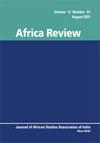Ethiopia’s new foreign policy challenges: scope for India’s engagement
IF 0.5
Q4 AREA STUDIES
引用次数: 1
Abstract
ABSTRACT Ethiopia is witnessing new twists and turns both in its domestic and foreign policy domain of late with the incumbent government in power adopting political and economic reforms aimed at fostering changes to bring about development. This has invariably provided an opportunity for India to consolidate its relationship with Ethiopia further. The new domestic political and economic reforms and the friendly gestures that the present government under Abiy Ahmed has made with its neighbors has drawn the attention of the international community to the extent of awarding him with Nobel Peace Prize. Such reform measures of Ethiopia have given India with wide scope to engage itself constructively and extend political and economic support in areas where both countries stand to gain. India's active engagement with Africa in general and Ethiopia in particular is all the more important given the China factor that has been competing with other countries of the region. This paper describes the domestic political developments in Ethiopia during the post Cold War era and its struggle to maintain the intricate ethnic balance that has characterized its nation-building process by tracing it from the days of King Haile Selassie I. It further analyzes the steps taken by the government to remove obstacles to peace and development through adopting economic liberalization measures and foreign policy changes. These are discussed in a chronological manner starting with a conceptual framework and using predominantly secondary sources and relying on personal observations.埃塞俄比亚新的外交政策挑战:与印度接触的空间
埃塞俄比亚最近在国内和外交政策领域都经历了新的曲折,执政的现任政府正在进行旨在促进变革以实现发展的政治和经济改革。这无疑为印度进一步巩固与埃塞俄比亚的关系提供了机会。阿比•艾哈迈德领导下的现政府对邻国的友好姿态和新的国内政治、经济改革引起了国际社会的关注,甚至被授予诺贝尔和平奖。埃塞俄比亚的这些改革措施为印度提供了广泛的空间,可以建设性地参与其中,并在两国都能获益的领域提供政治和经济支持。考虑到中国一直在与该地区其他国家竞争,印度与非洲特别是埃塞俄比亚的积极接触就显得尤为重要。本文描述了埃塞俄比亚在冷战后时代的国内政治发展,以及它为维持错综复杂的种族平衡而进行的斗争,这种平衡是其国家建设过程的特征,可以追溯到国王海尔·塞拉西一世(King Haile Selassie i)时代。本文进一步分析了政府采取的步骤,通过采取经济自由化措施和外交政策变化来消除和平与发展的障碍。这些都是按时间顺序讨论的,从一个概念框架开始,主要使用二手资料,并依靠个人观察。
本文章由计算机程序翻译,如有差异,请以英文原文为准。
求助全文
约1分钟内获得全文
求助全文
来源期刊

Africa Review
AREA STUDIES-
CiteScore
1.80
自引率
12.50%
发文量
22
期刊介绍:
Africa Review is an interdisciplinary academic journal of the African Studies Association of India (ASA India) and focuses on theoretical, historical, literary and developmental enquiries related to African affairs. The central aim of the journal is to promote a scholarly understanding of developments and change in Africa, publishing both original scholarship on developments in individual countries as well as comparative analyses examining the wider region. The journal serves the full spectrum of social science disciplinary communities, including anthropology, archaeology, history, law, sociology, demography, development studies, economics, education, gender studies, industrial relations, literature, politics and urban studies.
 求助内容:
求助内容: 应助结果提醒方式:
应助结果提醒方式:


